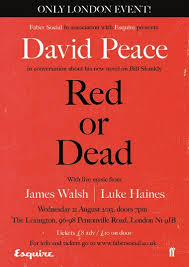By Andrew McKay.
There’s no doubt that Bill Shankly is the most iconic figure in Liverpool’s history, but the inherent problem is that people usually keep their awed distance from icons and so never get close enough to see them clearly. This results in the well-intentioned but frustrating Shankly heritage industry, which too often offers only sentimental worship instead of analysis, all garlanded with the obligatory litany of anecdotes. Not only is this wearying for those looking for something more rigorous but it also, ironically, does Shankly less than justice as eyes cast permanently upwards to the figure on the pedestal fail to see the real man standing at ground level in front of them. Given his seminal role in Liverpool’s history, Bill Shankly deserves better; he really was more important than that.
David Peace’s new novel Red or Dead, starting with Shankly’s appointment as manager in 1959 and going right through to September 1981, is an admirable attempt to provide a more balanced account. That’s not to say that he takes a revisionist wrecking-ball to Shankly’s reputation, as he is respectfully portrayed throughout, but crucially such respect does not prevent Peace examining the personal prices paid along the way. Indeed, his Shankly ends up uncomfortably close to a tragic hero precisely because the same qualities that enabled him to succeed while working would sour into burdensome flaws in retirement.
This article is for Subscribers only.
[ttt-subscribe-article]
